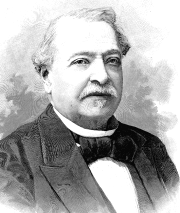| Profile | Major Works | Resources |
Léon Say, 1826-1896.

French liberal and prominent statesmen.
Jean-Baptiste Léon Say (commonly referred to as Léon Say, to avoid confusion with his grandfather) was the son of prominent liberal Horace Émile Say and grandson of the great classical economist Jean-Baptiste Say.
Educated at the College Bourbon, the Léon Say was a firm republican and a strident anti-Bonapartiste. During the 1848 Revolution, the young Léon Say enrolled in the National Guard. He opposed Louis Napoleon's ascent to power and the establishment of the Second Empire. He would would later join the Union Libérale with Adolphe Thiers, Jules Favre and Prévost-Paradol to oppose Napoleon III.
Léon Say published his first economics work, a history of Caisse d'éscompte, in 1848, earning himself a position in the Eichtal bank in 1850. From 1852, he worked as a manager at the French Lyon Railway, then from 1857 at the French Nord Railway. But he found time for writing, and after 1855 began making a name for himself in the pages of the Journal des Débats (he went on to marry the proprietor's Bertin's daughter, and taking over the periodical in 1870). He famously raked Baron Haussman, the prefect of Paris, then re-modeling the city for the emperor, over the financing of his projects (e.g.1865, 1868). He was also involved in the "cooperatives" movement with Léon Walras and others (1866).
Léon Say returned to politics after 1871, with the advent of the Third Republic. He served as finance minister in multiple cabinets - 1872-73 in the government of Adolphe Thiers, in 1875 under Louis Buffet, in 1877-79 during the presidency of MacMahon and 1882 under Jules Grévy. As finance minister, Say was saddled with the monumental task of figuring out how to pay the hefty war indemnity to Germany (1875). He was Senator of France from 1875 to 1882 (and Prefect of the Seine, Haussman's old position, from 1876). He was elected president of the International Monetary Conference of 1878, and in 1880 was sent as ambassador to London to negotiate a commercial treaty.
A French liberal of the old laissez faire stripe, Léon Say spent much of his later years opposing the rising tide of socialists and protectionists, and made himself a lightning rod for their furor. Say got himself elected to the lower Chamber of Deputies in 1889, but was unable to fend off the protectionist Méline tariff of 1892, that brought to end the liberal era of free trade launched by Chevalier back in 1860. Léon Say died in April, 1896, just a few days before Jules Méline became the prime minister of France.
|
Major Works of Léon Say
|
|
HET
|
|
Resources on Léon Say
|
All rights reserved, Gonçalo L. Fonseca
